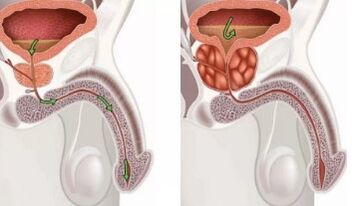Violation of morphology and prostate functions against the backdrop of long -term inflammatory process in the prostate gland is a sign of chronic flow of the disease.Given the fact that the disease affects half of the men of reproductive age, the treatment of prostatitis is not only a physician, but also an urgent social problem
Causes and manifestations of chronic prostatitis
The underlying cause of the disease is the infection of the prostate gland with the pathogenic flora contained in the urine.The process can pass through both the urethra from below and through the bladder from top to bottom.The main microorganisms that provoke the inflammatory process are:
- e.coli;
- staphylococcus;
- fungi;
- proteus;

parasitic pathogens, viral, etc.
non -specific, but not excluding the harmful effects remain chlamydia, gardnerella, gonococci and other pathogens of specific forms of urethral diseases.even as a result of the analysis of the general condition of the organs of the genitourinary system.Related diseases, power of immunity and other factors that affect slow, prolonged prostate development are taken into account.The cause of the development of the disease may be bronchitis, caries or sinusitis, as the pathogens that cause disease suffer from blood and are justified in the pelvic organs.An incorrect lifestyle that is unfavorable to the body or working conditions can also provoke a disease
which symptoms associate the disease and methods for its diagnosis
The prostate is characterized by a number of deviations during urination: it is done intermittent, difficult, fast and painful, there is a feeling of bubble fullness, itching in the perineum, a change in skin color in the area.In the urine, foreigners, mud and blood sediment can be visually observed
For diagnosis, a visual examination of the patient, laboratory tests (urine for antibiotic choice), as well as a number of hardware -type examinations, including ultrasound, MRI, etc.Despite the background of prostate, they can develop:
infertility;
oncology;
- powerless;
- adenoma, etc.
- This is why, when unpleasant symptoms appear, you should undergo a timely examination and undergo a course of treatment described by a urologist.As a rule, these are antibiotic group medicines (at least 14 days), analgesics, blocks.A good help of a drug treatment for a chronic illness is a prostate massage.Pre -blocking contributes to the relief of pain.Physiotherapy is important in treatment: ultrasound, magnetotherapy, inductometry, mud, bath, therapeutic enemas, etc.
- where therapy is not effective, and there is a risk of serious complications, patients are recommended to perform surgical interventions (bladder reesection, drainage of prostate, etc.).Immunity with proper nutrition, moderate physical activity will help improve significantly and expand the continuous functioning of the genitourinary organs.
Kjo është arsyeja pse, kur shfaqen simptoma të pakëndshme, ju duhet t'i nënshtroheni një ekzaminimi në kohë dhe t'i nënshtroheni një kursi trajtimi të përshkruar nga një urolog. Si rregull, këto janë ilaçe të grupit të antibiotikëve (të paktën 14 ditë), analgjezikë, blloqe. Një ndihmë e mirë e një trajtimi të drogës për një sëmundje kronike është një masazh i prostatës. Bllokada parapostatike kontribuon në heqjen e dhimbjes. Fizioterapia është e rëndësishme në trajtim: ultratinguj, magnetoterapi, induktometri, baltë, banjë, enemas terapeutik, etj.
Në rastet kur terapia nuk është efektive, dhe ekziston rreziku i komplikimeve serioze, pacientët rekomandohen të kryejnë ndërhyrje kirurgjikale (reseksionin e fshikëzës, kullimin e zonave të prekura të prostatës, etj.).
Urdhëruar jetën seksuale, ruajtjen e shëndetit dhe imunitetit me ushqimin e duhur, aktiviteti i moderuar fizik do të ndihmojë në përmirësimin e ndjeshëm dhe zgjerimin e funksionimit të pandërprerë të organeve gjenitourinare.



























